Ruth 1 meaning explained in AI Summary
Famine strikes Bethlehem, forcing Elimelech and his family to move to Moab. Tragedy strikes as Elimelech and his two sons die, leaving Naomi widowed and her daughters-in-law, Orpah and Ruth, also widowed. Naomi decides to return to Bethlehem and encourages her daughters-in-law to stay in Moab. Orpah chooses to remain, but Ruth pledges unwavering loyalty to Naomi, declaring, "Your people shall be my people, and your God my God." They journey together to Bethlehem.
The book of Ruth opens with a famine in Bethlehem, Judah. Elimelech, his wife Naomi, and their two sons, Mahlon and Chilion, leave their home to find food and refuge in the land of Moab.
Tragedy strikes as Elimelech dies, leaving Naomi to raise her sons alone. They marry Moabite women, Orpah and Ruth, but then, after about ten years, both sons die as well.
Now widowed and childless, Naomi hears that the famine in Judah has ended and decides to return to her homeland. She encourages her daughters-in-law to stay in Moab and remarry, releasing them from any obligation to her.
Orpah tearfully says goodbye and returns to her people, but Ruth refuses to leave Naomi's side. In a beautiful and famous declaration of loyalty, Ruth says to Naomi, "Where you go I will go, and where you stay I will stay. Your people will be my people and your God my God. Where you die I will die, and there I will be buried. May the Lord deal with me, be it ever so severely, if even death separates you and me" (Ruth 1:16-17).
The two women journey to Bethlehem together, where their arrival causes a stir. Naomi, however, is filled with bitterness over her losses and tells the townspeople to call her Mara ("bitter") instead of Naomi ("pleasant").
The chapter ends with Ruth and Naomi beginning their new life in Bethlehem, facing an uncertain future but bound together by love and loyalty.
Ruth 1 bible study ai commentary
The book of Ruth serves as a radiant story of divine providence and covenant faithfulness (hesed) set against the bleak backdrop of the era of the Judges. Chapter 1 introduces the core themes of emptiness and bitterness resulting from famine, displacement, and death. A family from Bethlehem ("House of Bread") ironically flees a famine, only to find death in the foreign land of Moab. The narrative meticulously strips the protagonist, Naomi, of her husband, sons, and home, bringing her to a point of utter desolation. Yet, amid this profound loss, the unwavering loyalty of her Moabite daughter-in-law, Ruth, plants a seed of hope, subtly foreshadowing God's unseen hand working to turn tragedy into a story of redemption that will ultimately shape the lineage of Israel's greatest king and the Messiah.
Ruth 1 Context
The narrative is explicitly set "in the days when the judges ruled," a period (c. 1350-1050 BC) infamous for its spiritual apostasy, social chaos, and moral anarchy, epitomized by the phrase, "In those days there was no king in Israel; everyone did what was right in his own eyes" (Jdg 21:25). This context makes the faithfulness, love, and integrity displayed in Ruth shine all the brighter as a stark contrast. The story involves Moab, a nation descended from Lot (Gen 19:37) and a frequent antagonist to Israel. According to the Law, Moabites were excluded from "the assembly of the LORD" (Deut 23:3), making an Israelite family's move there, and subsequent intermarriage, a desperate and questionable act.
Ruth 1:1
In the days when the judges ruled, there was a famine in the land, and a certain man of Bethlehem in Judah went to sojourn in the country of Moab, he and his wife and his two sons.
In-depth-analysis
- "When the judges ruled": Immediately sets a scene of chaos and faithlessness, making the subsequent loyalty of the characters remarkable.
- Famine in the land: Famines were often understood as a sign of divine judgment for disobedience (Deut 28:15, 23-24).
- Bethlehem in Judah: The name Bethlehem (בֵּית לָחֶם, Beit Lechem) means "House of Bread." The irony is profound: the House of Bread has no bread, prompting the family to leave the Promised Land.
- Sojourn in Moab: Leaving the land of God's inheritance for a pagan, and often hostile, nation was a spiritually precarious decision. Abraham also went down to Egypt during a famine, which led to compromise (Gen 12:10-13).
Bible references
- Jdg 21:25: "...every one did that which was right in his own eyes." (The chaotic moral/spiritual environment of Ruth).
- Gen 12:10: "Now there was a famine in the land, and Abram went down to Egypt..." (Parallel of leaving the land due to famine).
- Deut 28:23-24: "And the heavens over your head shall be bronze... The LORD will make the rain of your land powder and dust..." (Covenant curses for disobedience, including famine).
- 2 Kgs 8:1: "Then Elisha spoke to the woman whose son he had restored to life, saying, 'Arise and go, you and your household, and stay wherever you can; for the Lord has called for a famine...'" (Famines as instruments of God's will).
Cross references
Lev 26:19-20 (curses for disobedience); Gen 26:1 (famine in Isaac's time); Gen 47:4 (Jacob's family sojourning in Egypt).
Ruth 1:2
The name of the man was Elimelech and the name of his wife Naomi, and the names of his two sons were Mahlon and Chilion. They were Ephrathites from Bethlehem in Judah. They went into the country of Moab and remained there.
In-depth-analysis
- Elimelech (אֱלִימֶלֶךְ, Elimélekh): Means "My God is King." This name is deeply ironic, as his actions—leaving the land where Yahweh is King for Moab, where the god Chemosh was worshipped—suggest a lack of faith that his King would provide.
- Naomi (נָעֳמִי, Nā‘omî): Means "Pleasantness." This name will contrast sharply with her later self-designation, "Mara" (bitter).
- Mahlon and Chilion: Their names are prophetic of their doom. Mahlon (מַחְלוֹן) suggests "sickness," and Chilion (כִּלְיוֹן) suggests "wasting away" or "annihilation."
- Ephrathites: An older name for the region of Bethlehem (Gen 35:19). This detail is significant as it directly links the family to the prophesied birthplace of the Messiah (Mic 5:2).
Bible references
- Mic 5:2: "But you, O Bethlehem Ephrathah... from you shall come forth for me one who is to be ruler in Israel..." (Highlights the prophetic importance of their hometown).
- 1 Sam 17:12: "Now David was the son of an Ephrathite of Bethlehem in Judah, named Jesse..." (Establishes the lineage connection that this book will forge).
- Gen 35:19: "So Rachel died, and she was buried on the way to Ephrath (that is, Bethlehem)..." (Ancient connection of the name).
Ruth 1:3-5
But Elimelech, the husband of Naomi, died, and she was left with her two sons. They took Moabite wives; the name of the one was Orpah and the name of the other Ruth. They lived there about ten years. And both Mahlon and Chilion died, so that the woman was left without her two sons and her husband.
In-depth-analysis
- "Elimelech...died": The man who left to preserve his life finds death instead. The family is now without its male head and provider, a devastating blow in that patriarchal culture.
- Moabite wives: This was a controversial move. The Law explicitly forbade Moabites from entering the Lord's assembly (Deut 23:3), and later leaders like Nehemiah and Ezra would force Israelites to divorce foreign wives (Ezra 9-10; Neh 13:23-27). This narrative presents a counter-perspective.
- "Ten years": A significant period, showing this was not a short-term sojourn but a long-term settling in a foreign land. This deepens the tragedy; their attempt to build a life in Moab ends in total failure.
- "The woman was left without...": The language emphasizes Naomi’s utter bereavement and emptiness. She has lost her husband (protector) and sons (her future), leaving her in a socially and economically destitute state.
Bible references
- Deut 23:3: "No Ammonite or Moabite may enter the assembly of the LORD..." (The legal backdrop that makes these marriages problematic).
- Lam 1:1: "How lonely sits the city that was full of people! ...She who was a princess among the provinces has become a slave." (Echoes Naomi's descent from being a "full" family to being "empty" and destitute).
- Psa 88:18: "You have caused my beloved and my friend to shun me; my companions have become darkness." (Captures the depth of Naomi's isolation and loss).
Cross references
Ezra 9:1-2 (grief over intermarriage); Neh 13:1, 23 (condemnation of Moabite wives); Deut 7:3 (prohibition against intermarriage).
Polemics
This passage gently introduces a polemic against the strict separatism that characterized the post-exilic community under Ezra and Nehemiah. While their reforms were necessary for Israel's survival at the time, Ruth presents a different angle: a person's faithfulness to Yahweh is more important than their ethnic origin. Ruth the Moabitess will prove more faithful than many Israelites of the period.
Ruth 1:6-14
Then she arose with her daughters-in-law to return from the country of Moab, for she had heard... that the LORD had visited his people and given them food... And Orpah kissed her mother-in-law, but Ruth clung to her.
In-depth-analysis
- "the LORD had visited his people": This is a key turning point. God is not absent; His action back in Judah initiates Naomi’s journey home. Her hope is renewed not by her circumstances, but by news of God’s provision.
- Naomi’s Blessing (v. 8-9): Naomi selflessly releases her daughters-in-law, praying that the Lord will deal "kindly" (hesed) with them as they have with her and her deceased sons.
- Hesed (חֶסֶד): This is the first mention of the book’s central theme. Hesed is covenant loyalty, steadfast love, and kindness that goes beyond duty. Naomi recognizes their hesed and prays for God to repay it.
- Naomi's Logic (v. 11-13): Her argument is pragmatic and rooted in despair. She has no more sons to provide them with a future through levirate marriage (Deut 25:5-6), so it's logical for them to return to their own people.
- Orpah kissed... Ruth clung (v. 14): A powerful, physical depiction of their choices. Orpah’s kiss is one of farewell and affection, but she chooses her past and the path of reason. Ruth’s clinging (dabaq) is a deeper act of commitment and union.
- Dabaq (דָּבַק): This is the same Hebrew verb used in Genesis 2:24, where a man is to "hold fast" (or cleave) to his wife. Ruth’s action is a radical, covenantal bond.
Bible references
- Gen 2:24: "...and shall hold fast (dabaq) to his wife, and they shall become one flesh." (Shows the radical depth of Ruth’s "clinging" to Naomi).
- Deut 25:5-6: "If brothers dwell together, and one of them dies and has no son, the wife of the dead man..." (The custom of levirate marriage, which Naomi sees as impossible).
- Psa 136:1: "Give thanks to the LORD, for he is good, for his steadfast love (hesed) endures forever." (The ultimate source and example of the hesed Ruth embodies).
- Luke 9:57-62: Jesus speaks of the high cost of discipleship, requiring followers to leave behind family and old securities. (Parallels Ruth's costly decision to follow Naomi).
Ruth 1:15-18
And she said, “See, your sister-in-law has gone back to her people and to her gods; return after your sister-in-law.” But Ruth said, “Do not urge me to leave you or to return from following you. For where you go I will go, and where you lodge I will lodge. Your people shall be my people, and your God my God. Where you die I will die, and there will I be buried. May the LORD do so to me and more also if anything but death parts me from you.” And when Naomi saw that she was determined to go with her, she said no more.
In-depth-analysis
- "to her people and to her gods": Naomi makes the choice clear: this is not just about family, it is about religious allegiance. To return to Moab is to return to the god Chemosh.
- Ruth's Pledge: This is one of the most powerful declarations of faith and commitment in all of Scripture. It's a formal, binding oath.
- Shared Journey: "Where you go I will go"
- Shared Home: "Where you lodge I will lodge"
- Shared Identity: "Your people shall be my people" (Forsaking her Moabite identity)
- Shared Faith: "and your God my God" (The climax: converting to Yahweh)
- Covenant Oath: "May the LORD do so to me and more also..." is a self-cursing oath formula, calling upon Yahweh to punish her if she breaks her vow. It proves she is not just paying lip service; she has fully committed to Naomi's God. This Moabite woman calls on the name of Yahweh to seal her vow.
Bible references
- 2 Kgs 2:2: "As the Lord lives and as you yourself live, I will not leave you." (Elisha's similar pledge of loyalty to Elijah).
- Josh 24:15: "...choose this day whom you will serve... But as for me and my house, we will serve the LORD.” (Echoes Ruth's decisive choice to serve Yahweh).
- Mt 16:24-25: "...If anyone would come after me, let him deny himself and take up his cross and follow me." (Ruth's self-denial and costly discipleship is a model of what Christ calls for).
Ruth 1:19-21
So the two of them went on until they came to Bethlehem. And when they came to Bethlehem, the whole town was stirred because of them. And the women said, “Is this Naomi?” She said to them, “Do not call me Naomi; call me Mara, for the Almighty has dealt very bitterly with me. I went away full, and the LORD has brought me back empty..."
In-depth-analysis
- "Is this Naomi?": The town's shock reveals how much Naomi has been physically and emotionally ravaged by her decade of suffering.
- Naomi to Mara: She formally renounces her name "Pleasant" for Mara (מָרָא), meaning "Bitter." This is an act of profound grief and a public indictment of God.
- "the Almighty (Shaddai) has dealt very bitterly": She specifically names El Shaddai, God Almighty, the one who is supposed to bless and make fruitful (Gen 17:1). She feels her experience is a complete reversal of His character.
- "Full...Empty": A powerful literary framing device (inclusio) for the chapter. She left with a husband and two sons; she returns with nothing—in her eyes. She fails to see the value of Ruth who stands beside her.
- Blaming God: Naomi attributes her plight directly to the Lord's hand. This is similar to Job, who also questioned God amidst immense suffering but never fully renounced Him (Job 1:21). Her honesty is raw and palpable.
Bible references
- Job 1:21: "...The LORD gave, and the LORD has taken away; blessed be the name of the LORD." (Contrast in response; Job blesses, Naomi accuses, yet both acknowledge God's sovereignty).
- Lam 3:1, 15: "I am the man who has seen affliction under the rod of his wrath... He has filled me with bitterness..." (Captures the essence of Naomi’s "Mara" state).
- Gen 42:36: "And Jacob their father said to them, 'You have bereaved me of my children: Joseph is no more, and Simeon is no more, and you would take Benjamin. All this has come against me.'" (Parallel despair of a patriarch believing he has been left empty).
Ruth 1:22
So Naomi returned, and Ruth the Moabitess her daughter-in-law with her, who returned from the country of Moab. And they came to Bethlehem at the beginning of barley harvest.
In-depth-analysis
- The Narrator’s Voice: The chapter ends not with Naomi's bitter words, but with the narrator's hopeful observation. This final sentence is the pivot for the entire book.
- "and Ruth the Moabitess...with her": A gentle but firm correction to Naomi’s cry of being "empty." The narrator points out the treasure she has brought back with her.
- "beginning of barley harvest": After a chapter dominated by famine and death, this detail bursts with promise. Harvest signifies life, provision, and new beginnings. God’s providence, silent throughout the chapter, is now seen in the backdrop of a fruitful land. It sets the stage perfectly for chapter 2, where Ruth will go to glean in the fields.
Bible references
- John 4:35: "Do you not say, ‘There are yet four months, then comes the harvest’? Look, I tell you, lift up your eyes, and see that the fields are white for harvest." (The theme of harvest as a time of hope and ingathering).
- Lev 23:9-14: Describes the Feast of Firstfruits, which happens at the start of the barley harvest, celebrating God’s provision. (Connects their arrival to a specific time of worship and thanks).
- Prov 16:9: "The heart of man plans his way, but the LORD establishes his steps." (Summarizes the book's theme of God's providence working through human plans and tragedies).
Ruth chapter 1 analysis
- Theological Names: The names in the chapter function as a form of theological commentary. Elimelech ("My God is King") acts as if God is not. Naomi ("Pleasant") becomes Mara ("Bitter"). Mahlon ("Sickly") and Chilion ("Wasting") live out their names. The irony exposes human plans versus divine reality.
- Divine Hiddenness and Providence: God never speaks directly in the book of Ruth, yet His hand is everywhere. He sends the famine (v. 1), and then He ends it by "visiting His people" (v. 6). He is the one Naomi blames (v. 21), and He is the one whose providence is hinted at in the final line about the barley harvest (v. 22). This literary technique forces the reader to look for God's work in the "ordinary" events of life.
- Emptiness to Fullness: The central narrative arc of the book is established in this chapter. Naomi's declaration, "I went away full, and the LORD has brought me back empty," sets the problem that the rest of the book will solve. The narrative will slowly refill her life through Ruth and Boaz, culminating in the birth of a grandson.
- A Light in the Darkness of Judges: The story of selfless love (hesed) and faithfulness stands in stark opposition to the prevailing spirit of the age of the Judges. While Israel was consumed by civil war, idolatry, and lawlessness, this small, intimate story shows God preserving a faithful remnant, through whom He would bring forth King David.
- Inclusion of the Gentile: Ruth, a woman from a nation excluded by the Law, becomes the paradigm of faith and covenant loyalty. Her inclusion in the lineage of David—and ultimately of Jesus Christ (Mt 1:5)—is a powerful testament to the fact that God’s plan of salvation has always included people from all nations who turn to Him in faith.
Ruth 1 summary
Fleeing a famine, Naomi's family goes to Moab, where her husband and two sons die, leaving her desolate. She decides to return to Bethlehem, urging her Moabite daughters-in-law to stay behind. While Orpah agrees, Ruth makes a radical pledge of loyalty to Naomi and her God, Yahweh. They arrive in Bethlehem at the start of the barley harvest, where a bitter Naomi renames herself "Mara," believing God has left her empty, yet unknowingly holding the key to her restoration in Ruth.
Ruth 1 AI Image Audio and Video




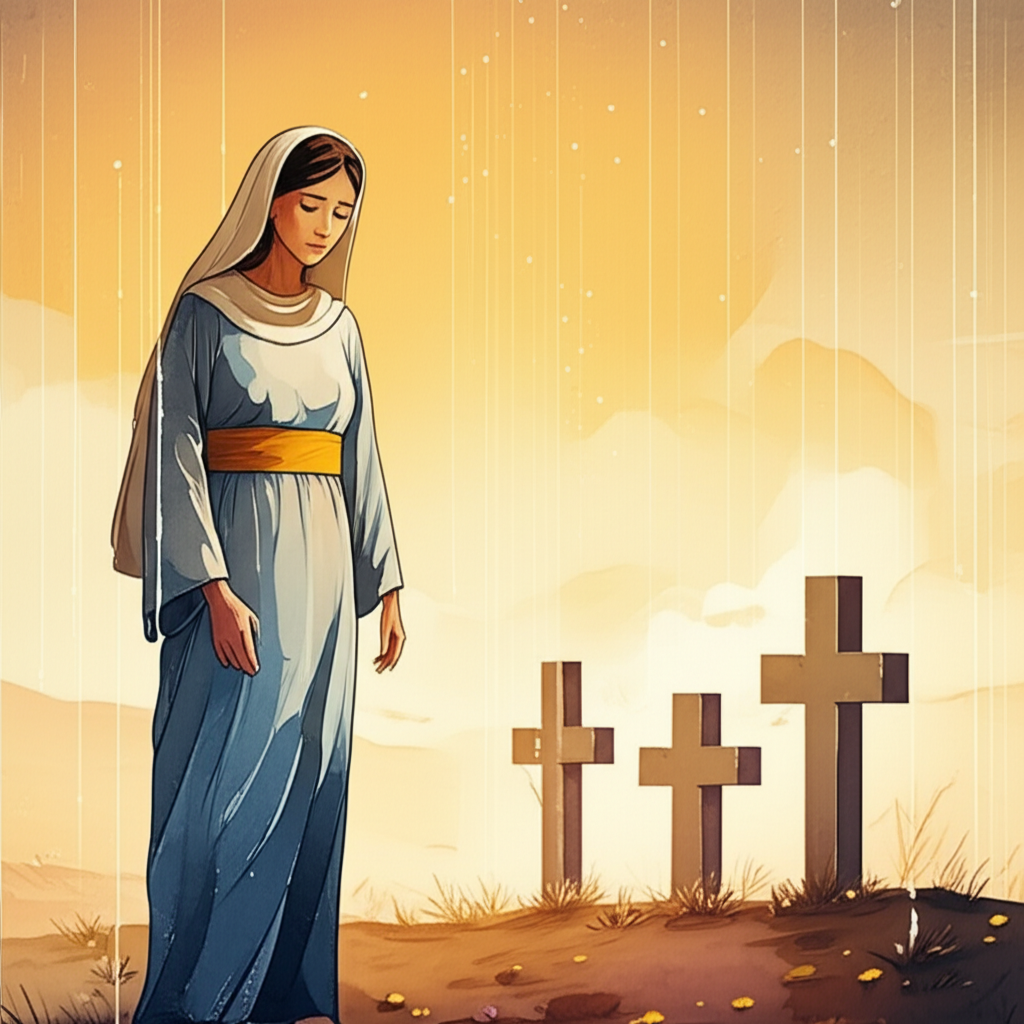
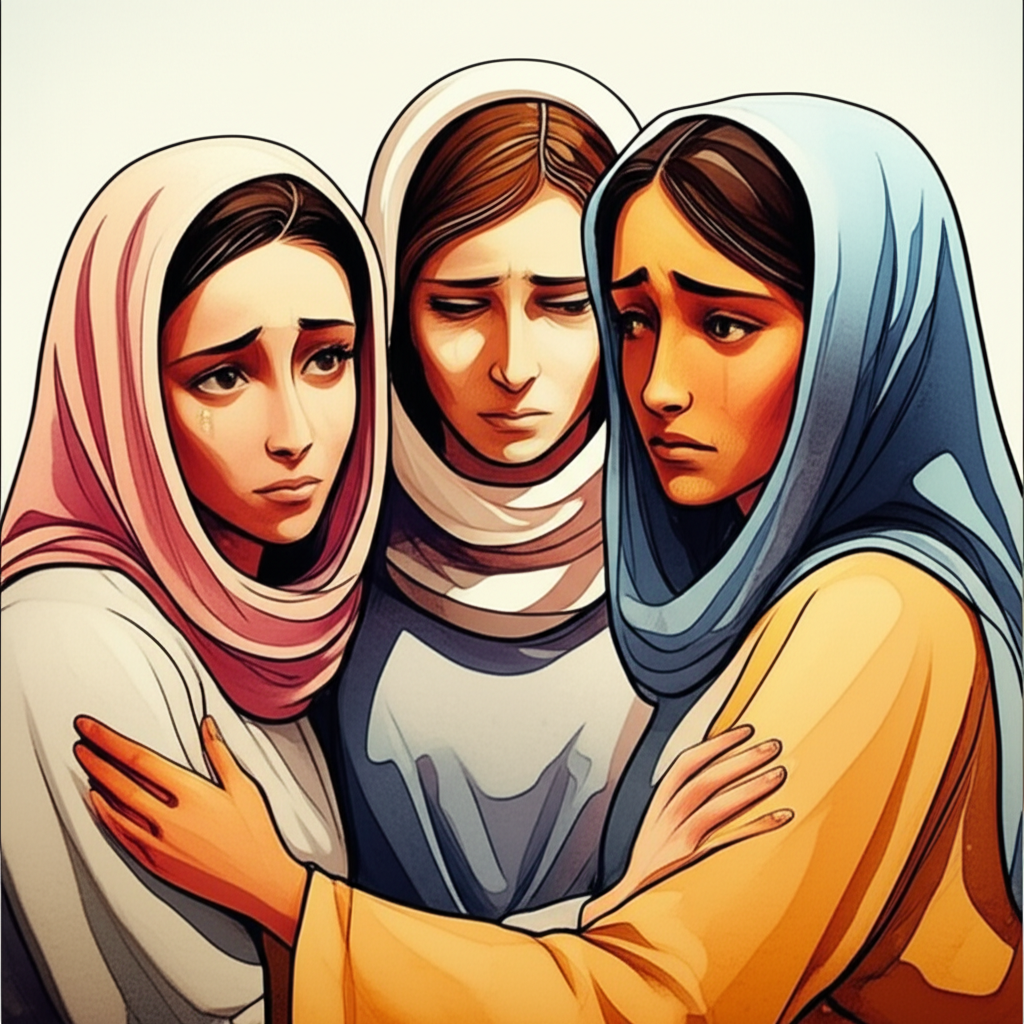
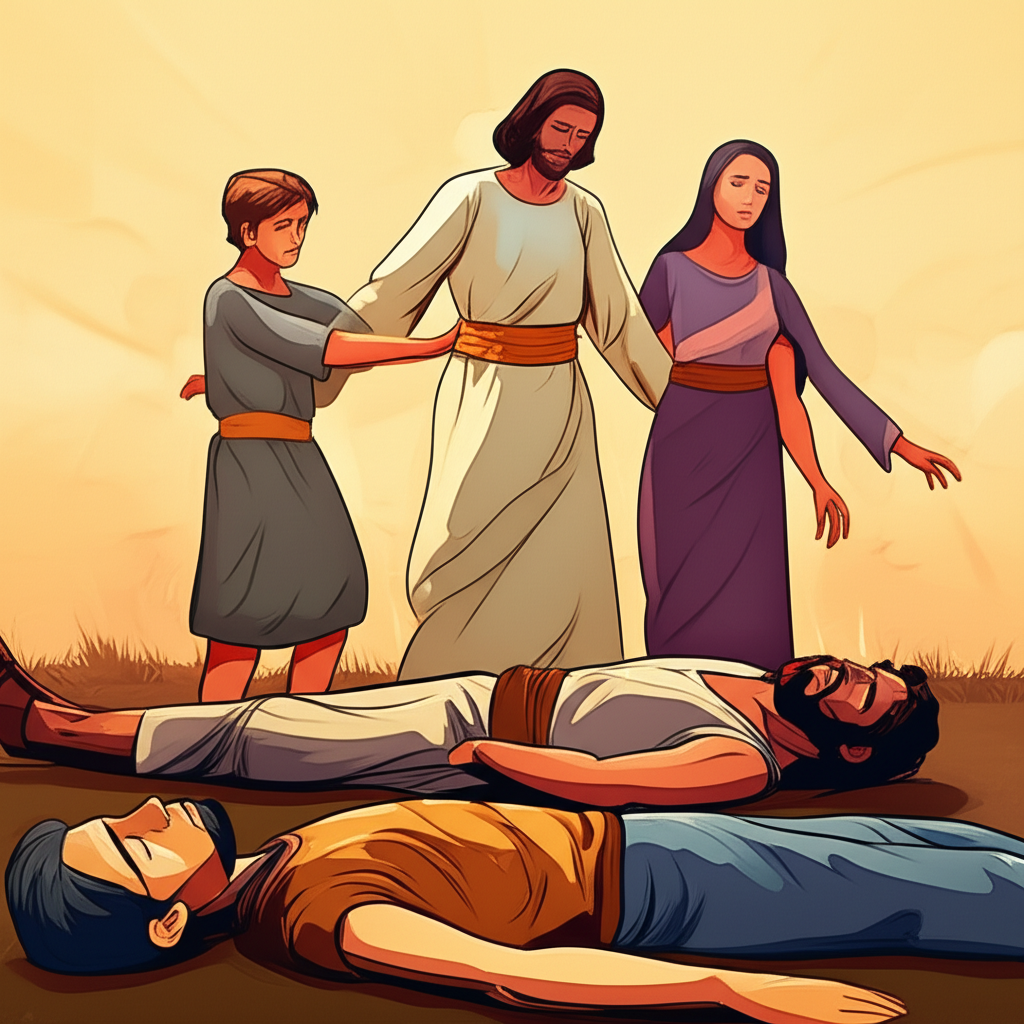
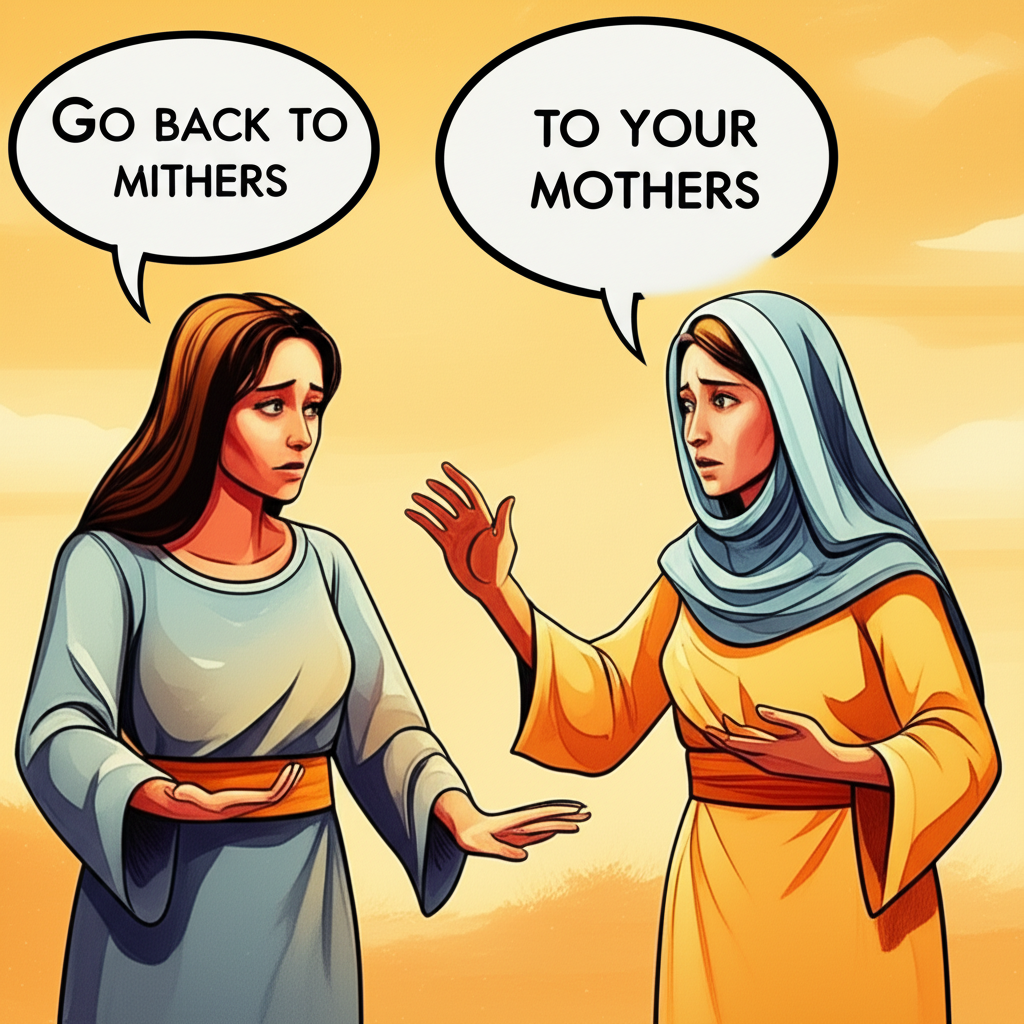

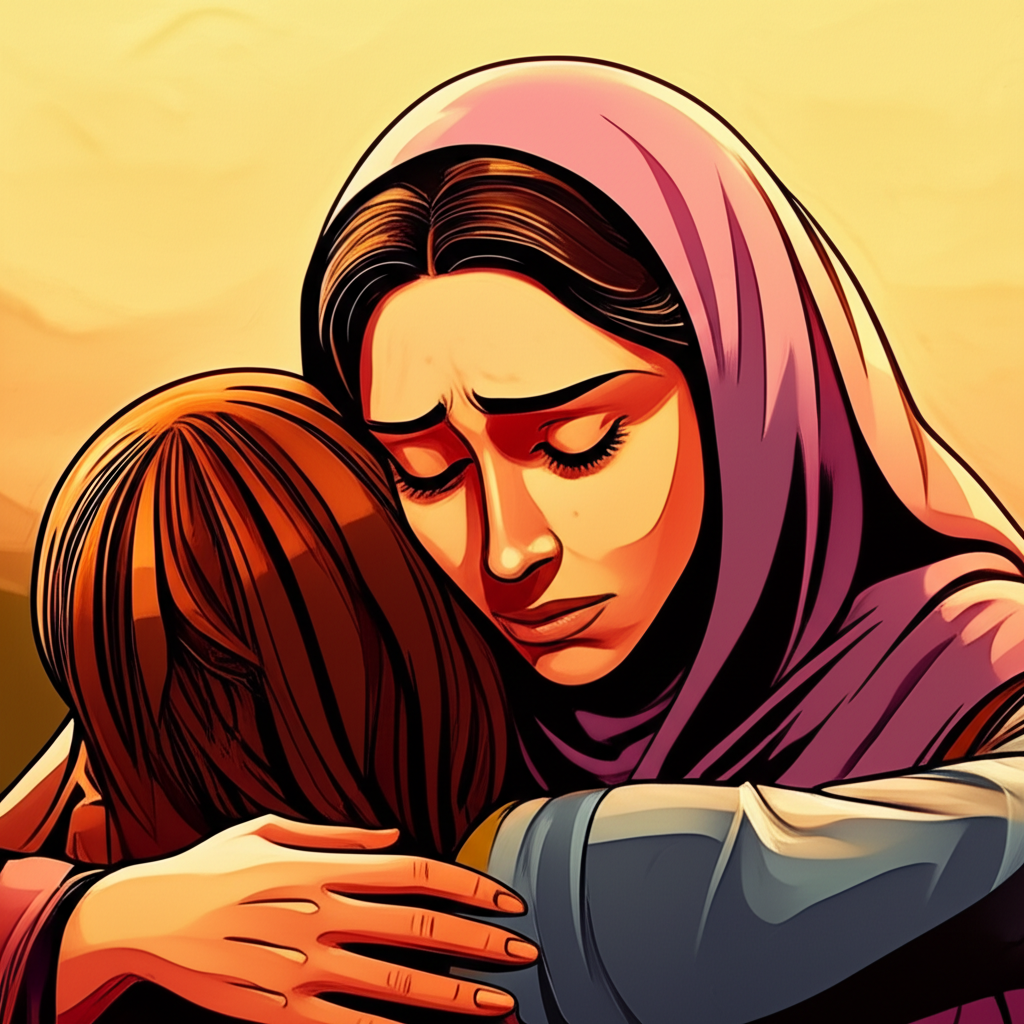
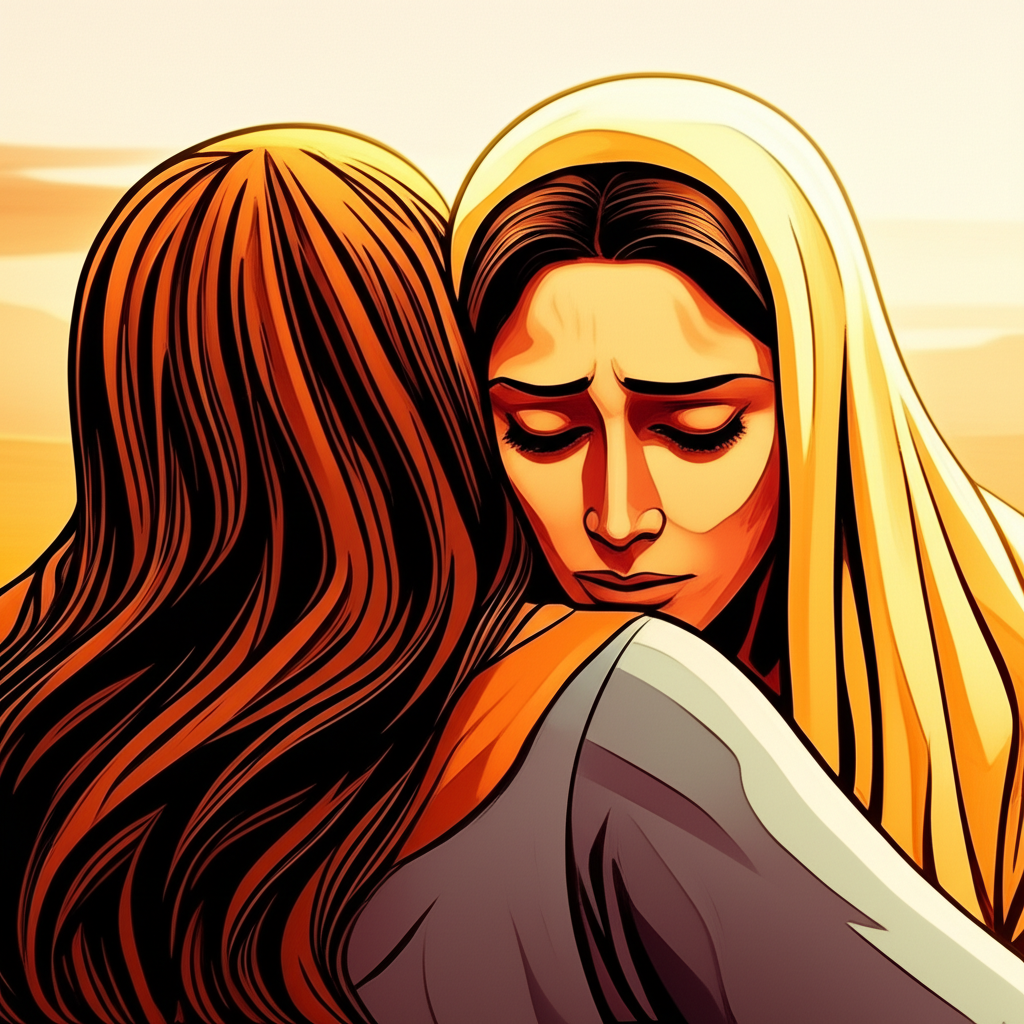

Ruth chapter 1 kjv
- 1 Now it came to pass in the days when the judges ruled, that there was a famine in the land. And a certain man of Bethlehemjudah went to sojourn in the country of Moab, he, and his wife, and his two sons.
- 2 And the name of the man was Elimelech, and the name of his wife Naomi, and the name of his two sons Mahlon and Chilion, Ephrathites of Bethlehemjudah. And they came into the country of Moab, and continued there.
- 3 And Elimelech Naomi's husband died; and she was left, and her two sons.
- 4 And they took them wives of the women of Moab; the name of the one was Orpah, and the name of the other Ruth: and they dwelled there about ten years.
- 5 And Mahlon and Chilion died also both of them; and the woman was left of her two sons and her husband.
- 6 Then she arose with her daughters in law, that she might return from the country of Moab: for she had heard in the country of Moab how that the LORD had visited his people in giving them bread.
- 7 Wherefore she went forth out of the place where she was, and her two daughters in law with her; and they went on the way to return unto the land of Judah.
- 8 And Naomi said unto her two daughters in law, Go, return each to her mother's house: the LORD deal kindly with you, as ye have dealt with the dead, and with me.
- 9 The LORD grant you that ye may find rest, each of you in the house of her husband. Then she kissed them; and they lifted up their voice, and wept.
- 10 And they said unto her, Surely we will return with thee unto thy people.
- 11 And Naomi said, Turn again, my daughters: why will ye go with me? are there yet any more sons in my womb, that they may be your husbands?
- 12 Turn again, my daughters, go your way; for I am too old to have an husband. If I should say, I have hope, if I should have an husband also to night, and should also bear sons;
- 13 Would ye tarry for them till they were grown? would ye stay for them from having husbands? nay, my daughters; for it grieveth me much for your sakes that the hand of the LORD is gone out against me.
- 14 And they lifted up their voice, and wept again: and Orpah kissed her mother in law; but Ruth clave unto her.
- 15 And she said, Behold, thy sister in law is gone back unto her people, and unto her gods: return thou after thy sister in law.
- 16 And Ruth said, Entreat me not to leave thee, or to return from following after thee: for whither thou goest, I will go; and where thou lodgest, I will lodge: thy people shall be my people, and thy God my God:
- 17 Where thou diest, will I die, and there will I be buried: the LORD do so to me, and more also, if ought but death part thee and me.
- 18 When she saw that she was stedfastly minded to go with her, then she left speaking unto her.
- 19 So they two went until they came to Bethlehem. And it came to pass, when they were come to Bethlehem, that all the city was moved about them, and they said, Is this Naomi?
- 20 And she said unto them, Call me not Naomi, call me Mara: for the Almighty hath dealt very bitterly with me.
- 21 I went out full and the LORD hath brought me home again empty: why then call ye me Naomi, seeing the LORD hath testified against me, and the Almighty hath afflicted me?
- 22 So Naomi returned, and Ruth the Moabitess, her daughter in law, with her, which returned out of the country of Moab: and they came to Bethlehem in the beginning of barley harvest.
Ruth chapter 1 nkjv
- 1 Now it came to pass, in the days when the judges ruled, that there was a famine in the land. And a certain man of Bethlehem, Judah, went to dwell in the country of Moab, he and his wife and his two sons.
- 2 The name of the man was Elimelech, the name of his wife was Naomi, and the names of his two sons were Mahlon and Chilion? Ephrathites of Bethlehem, Judah. And they went to the country of Moab and remained there.
- 3 Then Elimelech, Naomi's husband, died; and she was left, and her two sons.
- 4 Now they took wives of the women of Moab: the name of the one was Orpah, and the name of the other Ruth. And they dwelt there about ten years.
- 5 Then both Mahlon and Chilion also died; so the woman survived her two sons and her husband.
- 6 Then she arose with her daughters-in-law that she might return from the country of Moab, for she had heard in the country of Moab that the LORD had visited His people by giving them bread.
- 7 Therefore she went out from the place where she was, and her two daughters-in-law with her; and they went on the way to return to the land of Judah.
- 8 And Naomi said to her two daughters-in-law, "Go, return each to her mother's house. The LORD deal kindly with you, as you have dealt with the dead and with me.
- 9 The LORD grant that you may find rest, each in the house of her husband." So she kissed them, and they lifted up their voices and wept.
- 10 And they said to her, "Surely we will return with you to your people."
- 11 But Naomi said, "Turn back, my daughters; why will you go with me? Are there still sons in my womb, that they may be your husbands?
- 12 Turn back, my daughters, go?for I am too old to have a husband. If I should say I have hope, if I should have a husband tonight and should also bear sons,
- 13 would you wait for them till they were grown? Would you restrain yourselves from having husbands? No, my daughters; for it grieves me very much for your sakes that the hand of the LORD has gone out against me!"
- 14 Then they lifted up their voices and wept again; and Orpah kissed her mother-in-law, but Ruth clung to her.
- 15 And she said, "Look, your sister-in-law has gone back to her people and to her gods; return after your sister-in-law."
- 16 But Ruth said: "Entreat me not to leave you, Or to turn back from following after you; For wherever you go, I will go; And wherever you lodge, I will lodge; Your people shall be my people, And your God, my God.
- 17 Where you die, I will die, And there will I be buried. The LORD do so to me, and more also, If anything but death parts you and me."
- 18 When she saw that she was determined to go with her, she stopped speaking to her.
- 19 Now the two of them went until they came to Bethlehem. And it happened, when they had come to Bethlehem, that all the city was excited because of them; and the women said, "Is this Naomi?"
- 20 But she said to them, "Do not call me Naomi; call me Mara, for the Almighty has dealt very bitterly with me.
- 21 I went out full, and the LORD has brought me home again empty. Why do you call me Naomi, since the LORD has testified against me, and the Almighty has afflicted me?"
- 22 So Naomi returned, and Ruth the Moabitess her daughter-in-law with her, who returned from the country of Moab. Now they came to Bethlehem at the beginning of barley harvest.
Ruth chapter 1 niv
- 1 In the days when the judges ruled, there was a famine in the land. So a man from Bethlehem in Judah, together with his wife and two sons, went to live for a while in the country of Moab.
- 2 The man's name was Elimelek, his wife's name was Naomi, and the names of his two sons were Mahlon and Kilion. They were Ephrathites from Bethlehem, Judah. And they went to Moab and lived there.
- 3 Now Elimelek, Naomi's husband, died, and she was left with her two sons.
- 4 They married Moabite women, one named Orpah and the other Ruth. After they had lived there about ten years,
- 5 both Mahlon and Kilion also died, and Naomi was left without her two sons and her husband.
- 6 When Naomi heard in Moab that the LORD had come to the aid of his people by providing food for them, she and her daughters-in-law prepared to return home from there.
- 7 With her two daughters-in-law she left the place where she had been living and set out on the road that would take them back to the land of Judah.
- 8 Then Naomi said to her two daughters-in-law, "Go back, each of you, to your mother's home. May the LORD show you kindness, as you have shown kindness to your dead husbands and to me.
- 9 May the LORD grant that each of you will find rest in the home of another husband." Then she kissed them goodbye and they wept aloud
- 10 and said to her, "We will go back with you to your people."
- 11 But Naomi said, "Return home, my daughters. Why would you come with me? Am I going to have any more sons, who could become your husbands?
- 12 Return home, my daughters; I am too old to have another husband. Even if I thought there was still hope for me?even if I had a husband tonight and then gave birth to sons?
- 13 would you wait until they grew up? Would you remain unmarried for them? No, my daughters. It is more bitter for me than for you, because the LORD's hand has turned against me!"
- 14 At this they wept aloud again. Then Orpah kissed her mother-in-law goodbye, but Ruth clung to her.
- 15 "Look," said Naomi, "your sister-in-law is going back to her people and her gods. Go back with her."
- 16 But Ruth replied, "Don't urge me to leave you or to turn back from you. Where you go I will go, and where you stay I will stay. Your people will be my people and your God my God.
- 17 Where you die I will die, and there I will be buried. May the LORD deal with me, be it ever so severely, if even death separates you and me."
- 18 When Naomi realized that Ruth was determined to go with her, she stopped urging her.
- 19 So the two women went on until they came to Bethlehem. When they arrived in Bethlehem, the whole town was stirred because of them, and the women exclaimed, "Can this be Naomi?"
- 20 "Don't call me Naomi," she told them. "Call me Mara, because the Almighty has made my life very bitter.
- 21 I went away full, but the LORD has brought me back empty. Why call me Naomi? The LORD has afflicted me; the Almighty has brought misfortune upon me."
- 22 So Naomi returned from Moab accompanied by Ruth the Moabite, her daughter-in-law, arriving in Bethlehem as the barley harvest was beginning.
Ruth chapter 1 esv
- 1 In the days when the judges ruled there was a famine in the land, and a man of Bethlehem in Judah went to sojourn in the country of Moab, he and his wife and his two sons.
- 2 The name of the man was Elimelech and the name of his wife Naomi, and the names of his two sons were Mahlon and Chilion. They were Ephrathites from Bethlehem in Judah. They went into the country of Moab and remained there.
- 3 But Elimelech, the husband of Naomi, died, and she was left with her two sons.
- 4 These took Moabite wives; the name of the one was Orpah and the name of the other Ruth. They lived there about ten years,
- 5 and both Mahlon and Chilion died, so that the woman was left without her two sons and her husband.
- 6 Then she arose with her daughters-in-law to return from the country of Moab, for she had heard in the fields of Moab that the LORD had visited his people and given them food.
- 7 So she set out from the place where she was with her two daughters-in-law, and they went on the way to return to the land of Judah.
- 8 But Naomi said to her two daughters-in-law, "Go, return each of you to her mother's house. May the LORD deal kindly with you, as you have dealt with the dead and with me.
- 9 The LORD grant that you may find rest, each of you in the house of her husband!" Then she kissed them, and they lifted up their voices and wept.
- 10 And they said to her, "No, we will return with you to your people."
- 11 But Naomi said, "Turn back, my daughters; why will you go with me? Have I yet sons in my womb that they may become your husbands?
- 12 Turn back, my daughters; go your way, for I am too old to have a husband. If I should say I have hope, even if I should have a husband this night and should bear sons,
- 13 would you therefore wait till they were grown? Would you therefore refrain from marrying? No, my daughters, for it is exceedingly bitter to me for your sake that the hand of the LORD has gone out against me."
- 14 Then they lifted up their voices and wept again. And Orpah kissed her mother-in-law, but Ruth clung to her.
- 15 And she said, "See, your sister-in-law has gone back to her people and to her gods; return after your sister-in-law."
- 16 But Ruth said, "Do not urge me to leave you or to return from following you. For where you go I will go, and where you lodge I will lodge. Your people shall be my people, and your God my God.
- 17 Where you die I will die, and there will I be buried. May the LORD do so to me and more also if anything but death parts me from you."
- 18 And when Naomi saw that she was determined to go with her, she said no more.
- 19 So the two of them went on until they came to Bethlehem. And when they came to Bethlehem, the whole town was stirred because of them. And the women said, "Is this Naomi?"
- 20 She said to them, "Do not call me Naomi; call me Mara, for the Almighty has dealt very bitterly with me.
- 21 I went away full, and the LORD has brought me back empty. Why call me Naomi, when the LORD has testified against me and the Almighty has brought calamity upon me?"
- 22 So Naomi returned, and Ruth the Moabite her daughter-in-law with her, who returned from the country of Moab. And they came to Bethlehem at the beginning of barley harvest.
Ruth chapter 1 nlt
- 1 In the days when the judges ruled in Israel, a severe famine came upon the land. So a man from Bethlehem in Judah left his home and went to live in the country of Moab, taking his wife and two sons with him.
- 2 The man's name was Elimelech, and his wife was Naomi. Their two sons were Mahlon and Kilion. They were Ephrathites from Bethlehem in the land of Judah. And when they reached Moab, they settled there.
- 3 Then Elimelech died, and Naomi was left with her two sons.
- 4 The two sons married Moabite women. One married a woman named Orpah, and the other a woman named Ruth. But about ten years later,
- 5 both Mahlon and Kilion died. This left Naomi alone, without her two sons or her husband.
- 6 Then Naomi heard in Moab that the LORD had blessed his people in Judah by giving them good crops again. So Naomi and her daughters-in-law got ready to leave Moab to return to her homeland.
- 7 With her two daughters-in-law she set out from the place where she had been living, and they took the road that would lead them back to Judah.
- 8 But on the way, Naomi said to her two daughters-in-law, "Go back to your mothers' homes. And may the LORD reward you for your kindness to your husbands and to me.
- 9 May the LORD bless you with the security of another marriage." Then she kissed them good-bye, and they all broke down and wept.
- 10 "No," they said. "We want to go with you to your people."
- 11 But Naomi replied, "Why should you go on with me? Can I still give birth to other sons who could grow up to be your husbands?
- 12 No, my daughters, return to your parents' homes, for I am too old to marry again. And even if it were possible, and I were to get married tonight and bear sons, then what?
- 13 Would you wait for them to grow up and refuse to marry someone else? No, of course not, my daughters! Things are far more bitter for me than for you, because the LORD himself has raised his fist against me."
- 14 And again they wept together, and Orpah kissed her mother-in-law good-bye. But Ruth clung tightly to Naomi.
- 15 "Look," Naomi said to her, "your sister-in-law has gone back to her people and to her gods. You should do the same."
- 16 But Ruth replied, "Don't ask me to leave you and turn back. Wherever you go, I will go; wherever you live, I will live. Your people will be my people, and your God will be my God.
- 17 Wherever you die, I will die, and there I will be buried. May the LORD punish me severely if I allow anything but death to separate us!"
- 18 When Naomi saw that Ruth was determined to go with her, she said nothing more.
- 19 So the two of them continued on their journey. When they came to Bethlehem, the entire town was excited by their arrival. "Is it really Naomi?" the women asked.
- 20 "Don't call me Naomi," she responded. "Instead, call me Mara, for the Almighty has made life very bitter for me.
- 21 I went away full, but the LORD has brought me home empty. Why call me Naomi when the LORD has caused me to suffer and the Almighty has sent such tragedy upon me?"
- 22 So Naomi returned from Moab, accompanied by her daughter-in-law Ruth, the young Moabite woman. They arrived in Bethlehem in late spring, at the beginning of the barley harvest.
- Bible Book of Ruth
- 1 Story of Ruth and Naomi
- 2 Boaz and Ruth
- 3 Ruth and Boaz at the Threshing Floor
- 4 Boaz marries and redeems Ruth